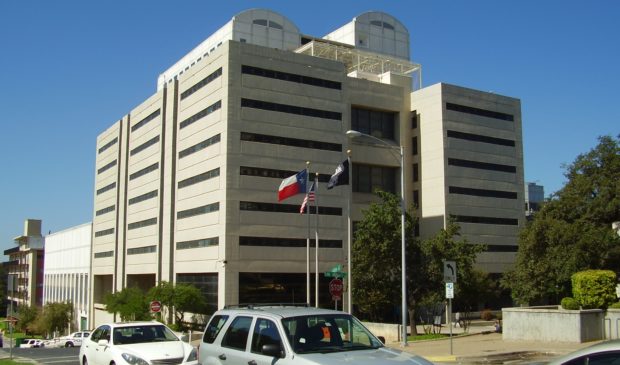African-Americans spend more time in Travis County jail for same offenses as whites
Friday, July 14, 2017 by
Jack Craver Travis County has a long way to go before its criminal justice system matches its progressive reputation, according to a report released Thursday by a local advocacy group.
African-Americans booked into the county jail spend more time behind bars than whites charged with the same crime, said the analysis by Grassroots Leadership, a community organizing group that focuses largely on immigrant rights and reforming the criminal justice system.
A black person booked into the jail is there for an average of 22.5 days before being released, compared to 16.8 days for Hispanics and 13.9 days for whites.
Most jail inmates have not been convicted of a crime but are waiting to be granted bail or are awaiting trial.
Not only are African-Americans less likely to be granted a personal recognizance bond, but even those who are spend more time in jail before – an average of an average of 6.3 days compared to 3.6 days for whites.
The disparities for certain offenses are particularly pronounced. A white person arrested for drunk driving spends an average of five days in jail, compared to an average of 11.5 days for Hispanics and 14.9 days for African-Americans. A white person booked for small possession of marijuana spends an average of 3.1 days in jail, while Hispanics and blacks spend an average of 14.9 and 17.9 days behind bars, respectively.
At a press conference held in front of the Blackwell-Thurman Criminal Justice Center, speakers from a variety of organizations described the findings of the report as evidence of persistent racism in the local criminal justice system.
“While class inequality, and the inability to pay bail, undoubtedly feeds into these numbers, racial discrimination must also be an important factor, if not the primary (factor),” said Chris Harris, a data analyst for Grassroots Leadership who compiled the data in the report.
The report included eight demands of elected officials and law enforcement, including ending arrests for low-level traffic offenses, such as driving with an invalid license, ending arrests for possession of less than four ounces of marijuana and assigning inmates defense counsel within 48 hours of arrest.
The group also urged the county to develop a “more robust” pretrial diversion program in which people are offered the chance to avoid prosecution in exchange for meeting certain requirements, such as counseling.
While Travis County, in contrast to many other large counties in Texas, releases the great majority of inmates on personal recognizance bonds that do not require posting bail, the group demanded that the county assess the criteria it is using to determine which defendants get PR bonds.
Finally, Grassroots demands that the county compile and report data on the jail population and that it establish a “criminal justice community oversight group with decision-making authority led by those most impacted by over-policing and incarceration.”
The speakers implored the public to put pressure on elected officials and hold those who fail to act accountable in elections.
“We’re going to show up to these ballot boxes like we show up to the club,” quipped Lewis Conway Jr., an organizer with Grassroots Leadership involved with the Texas Advocates for Justice program, which seeks to engage formerly incarcerated people in the political process.
Texas allows those convicted of felonies to vote once they have completed their sentence, including probation. However, many people with criminal records assume that they never regain the right to vote, Conway Jr. explained in an interview. Part of his job is getting people to understand when their voting rights are restored and, more importantly, convincing them that their vote matters.
“Voting is power; organizing is power,” he said. “You don’t win because you’re right; you win because you’re strong. And that’s our problem right now. We’re not strong politically.”
In a statement, County Judge Sarah Eckhardt applauded the report, noting that her staff had been collaborating with Grassroots Leadership during its preparation and that the county has already begun to “take action” on some of the group’s recommendations, including by establishing a sobriety center and speeding up the adjudication process for defendants.
Eckhardt added that the county has continued to work to improve its pretrial diversion programs, calling them “already among the most robust in the state.”
Nevertheless, said Eckhardt, “We absolutely must explore the root causes of institutional racism when we seek to bring our community values to bear within our criminal justice system.”
In an interview with the Austin Monitor, Major Wes Priddy, the head of corrections for the Travis County Sheriff’s Department, said that there undoubtedly are “social injustices” that result in the disparities described in the Grassroots report. He stressed, however, that those running the jail, notably the sheriff’s department, do not decide how long an inmate stays behind bars.
“The jail doesn’t control who we’ve got incarcerated,” he said. “That’s all done by the legal system.”
Photo by WhisperToMe (Own work) [Public domain], via Wikimedia Commons.
The Austin Monitor’s work is made possible by donations from the community. Though our reporting covers donors from time to time, we are careful to keep business and editorial efforts separate while maintaining transparency. A complete list of donors is available here, and our code of ethics is explained here.
You're a community leader
And we’re honored you look to us for serious, in-depth news. You know a strong community needs local and dedicated watchdog reporting. We’re here for you and that won’t change. Now will you take the powerful next step and support our nonprofit news organization?







